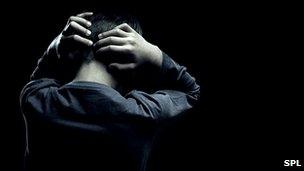Living with Post Traumatic Stress Disorder
- Published

Post Traumatic Stress Disorder can occur at any age
Life is rarely a completely smooth journey and most of us will experience unpleasant or frightening events at some point.
Although distressing at the time, the intensity of the feelings usually fades quickly and we are able to continue with our lives as before.
If we are subject to or witness an exceptionally traumatic, the effects are likely to be longer lasting.
This is a normal response and can interfere with daily life.
The majority of people will gradually adjust to the experience, but for one in three people the effects will be longer lasting and more debilitating.
These people will develop symptoms of Post Traumatic Stress Disorder (PTSD).
Possible causes of PTSD
Psychological
Remembering things clearly can help you understand what happened and, perhaps, help you recover.
Avoidance helps you not become exhausted from remembering a trauma. It keeps the number of 'replays' down to a manageable level.
Flashbacks force you to think about what has happened and decide what to do if it happens again. Being 'on guard' means that you can react quickly if another crisis happens and can give you the energy you need to carry on afterwards.
Physical
Vivid memories keep your levels of adrenaline high, you will feel tense, irritable and unable to relax or sleep well.
The hippocampus is the part of the brain that processes memories. In PTSD, high levels of stress hormones, like adrenaline, may stop it from processing the memories of the event, producing continuing flashbacks and nightmares.
Symptoms of PTSD
Symptoms of PTSD usually start within six months, and sometimes only a few weeks after the trauma.
After the traumatic event you can feel grief-stricken, depressed, anxious, guilty and angry. In PTSD you may also:
Have flashbacks and nightmares, reliving the event in your mind, again and again.
Avoid thinking and feeling upset about it by keeping busy and avoiding anything or anyone that reminds you.
Be 'on guard' - you stay alert all the time, can't relax, feel anxious and can't sleep.
Feel physical symptoms - aches and pains, diarrhoea, irregular heartbeats, headaches, feelings of panic and fear, depression.
Start drinking too much alcohol or using drugs (including painkillers).
PTSD can occur at any age, but if it happens during childhood it may affect how the child develops as a person.
They may feel guilty or ashamed or find it difficult to trust others.
Treatment
Try to get back to your usual routine, talk about what happened to someone you trust and try relaxation exercises. Eat regularly, take exercise and spend time with family and friends.
It could help to go back to where the traumatic event happened, but make sure you feel ready for this. Take care with driving - you're more likely to have an accident .
Don't be hard on yourself or expect too much. PTSD symptoms aren't a sign of weakness, They're a normal reaction of normal people to terrifying experiences. Don't avoid other people, drink or smoke a lot, miss sleep or meals.
You will know you're on the road to recovery when you:
think about it without becoming distressed
don't feel constantly under threat
don't think about it at inappropriate times
Local Support Groups
Community Veterans' Service
A Cornwall Partnership NHS Foundation Trust, county wide service to promote mental health and provide support to veterans and their carers. The service is available
weekdays between 9.00 am - 5.00 pm.
Veterans' Groups
Service Veterans' treatment and education groups which meet monthly in Penzance and Bodmin.
Last Wednesday of each month 1.00 - 3.00 pm at Richmond House, Tolver Place, Tolver Road, Penzance, TR18 2AB.
Second Tuesday of each month 1.00 - 3.00 pm at The Keep, Lostwithiel Road, Bodmin, PL31 1DL.
Surf Action
A non-profit organisation focusing on the wellbeing and support of combat veterans and their families.
Tel: 01736 811920
For support websites and more information, see our weblinks on the top right hand side of this page.
- Published24 February 2011
- Published15 September 2010